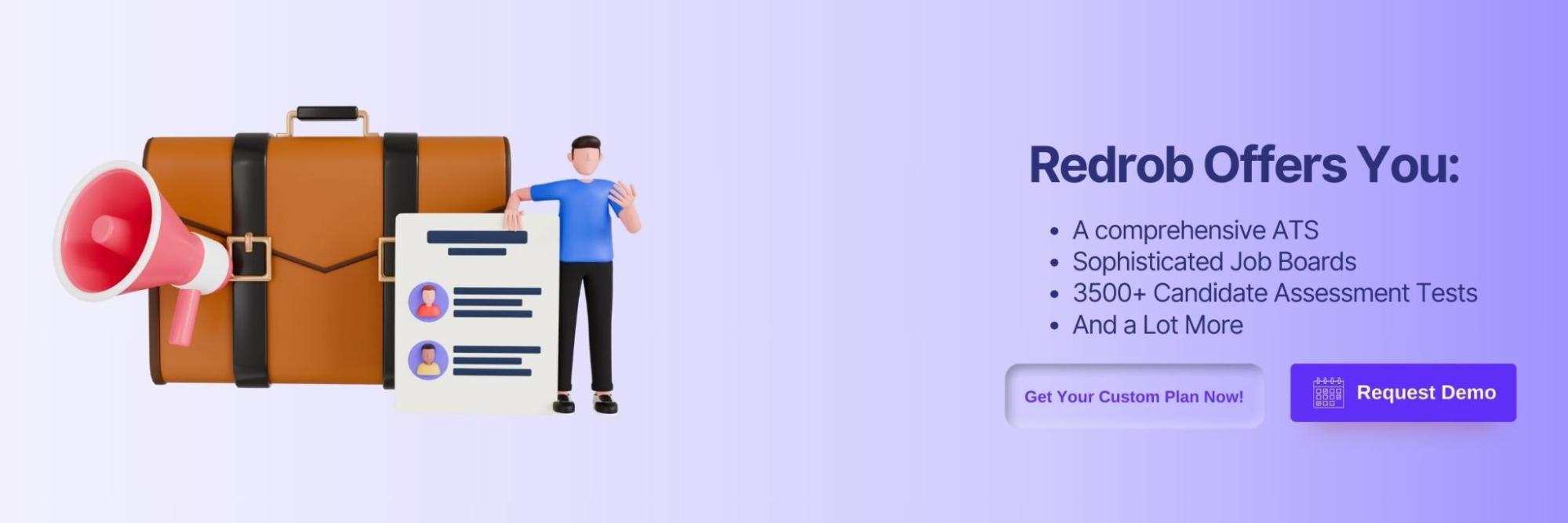Steps in Recruiting Top Talent
12 min read
•
Sep 24, 2024

Soumyata Singh
Recruiting candidates with the best talent takes continuous effort. Only with a solid recruitment strategy and its step-by-step implementation, is it possible to hire deserving candidates faster. You need to find out ways to stand out differently and better from competitors, and analyze your efforts along the way to make sure you’re doing the right thing.
In this blog, we tell you about the most important strategies and steps to recruit top talent easily.
What Is a Recruitment Strategy?
A recruitment strategy is a structured approach to recruiting candidates. It outlines how you will attract, assess, and hire the right talent. A clear recruitment strategy aligns your hiring goals with the company's overall objectives.
Understanding the Key Elements
The key elements of a recruitment strategy include understanding your hiring needs, outlining the ideal candidate profile, and creating a timeline for hiring. Recruiting candidates starts with defining your company's unique value proposition. This attracts top talent. Use data-driven insights to adjust your strategy when needed. For example, 52% of recruiters say that the hardest part of their job is finding the right talent, making it crucial to refine your approach over time.
Long-Term Connections
Building long-term connections with candidates can enhance your talent pool. Even if a candidate isn’t hired now, maintaining communication keeps them engaged for future roles. According to LinkedIn, 70% of the global workforce consists of passive talent. This means most people aren’t actively looking but could be open to the right opportunity. Establishing relationships with these candidates improves your chances when new roles open.
A solid recruitment strategy ensures you are recruiting candidates effectively while keeping future opportunities in mind.
Importance of a Good Recruitment Strategy
A good recruitment strategy is essential for hiring success. It helps you streamline the process of recruiting candidates and reduces time spent on unqualified applicants. With a clear plan, you can improve the quality of hires, saving both time and resources.
Having a well-defined strategy brings many benefits, such as:
Improved Hiring Efficiency: You reduce the time it takes to find the right candidate. On average, companies with a strong recruitment process reduce hiring time by 60%.
Higher Quality Hires: A clear strategy helps you target the best talent. This improves employee performance and retention.
Cost Savings: Filling a vacancy quickly and with the right candidate lowers recruitment costs.
A structured approach to recruiting candidates also boosts your employer brand. Candidates value a smooth and transparent hiring process, which strengthens your company’s reputation in the job market.
Key Phases of the Recruitment Process
Understanding the recruitment process is essential for recruiting candidates efficiently. Breaking down each phase helps you streamline hiring and ensure a great fit.
1. Identifying the Hiring Needs
Start by identifying what your company needs. Determine if you need new skills or more people to meet growing demand. This step is crucial for recruiting candidates who align with your company’s goals.
2. Preparing the Job Description
A clear job description helps attract the right talent. Make sure it lists key responsibilities, qualifications, and benefits. Industry leaders say, an accurate job description speeds up the hiring process.
3. Talent Search
Use various platforms to search for candidates. Posting on job boards, using recruitment software, and tapping into social networks can widen your reach. Recruiting candidates from multiple sources increases the chances of finding the perfect fit.
4. Screening and Shortlisting
Narrow down your candidates based on their resumes, experience, and skills. This step saves time during interviews. Efficiently screening candidates ensures you’re only interviewing those who meet your requirements.
5. Interviewing
Interviews allow you to assess the candidate’s fit for the role and company culture. Make sure to ask both technical and behavioral questions. Structured interviews have been proven to be twice as effective as unstructured ones in predicting job performance.
6. Evaluation and Offer of Employment
After interviews, evaluate candidates based on their skills, cultural fit, and salary expectations. Once you decide, extend an offer promptly. Recruiting candidates successfully means acting fast, as top talent may receive multiple offers.
7. Introduction and Induction of the New Employee
The process doesn't end once the candidate accepts the offer. Proper onboarding is key to retaining talent. Studies show that companies with a strong onboarding process improve retention by 82%. A smooth induction ensures new hires feel welcomed and prepared for their roles.
Now that you have clarity about these phases, let’s explore how to develop a recruitment strategy that ensures long-term success in recruiting candidates.
How to Develop a Recruitment Strategy
Developing a recruitment strategy is essential for recruiting candidates efficiently and effectively. It ensures you're attracting and hiring the right talent while aligning with your company's goals.
Review Your Recruitment Metrics and Goals
Start by reviewing past recruitment efforts. Analyze metrics such as time-to-hire, cost-per-hire, and quality of hire. These numbers give you insights into how well your current strategy is working. Identify any gaps and set realistic goals for improvement. For instance, if your time-to-hire is longer than industry averages, you may need to optimize your process.
Invest in Recruitment Tools

Investing in the right tools can improve your hiring efficiency. Applicant tracking systems (ATS), recruitment automation, and AI-powered tools can streamline recruiting candidates by saving time and reducing manual tasks. For example, ATS software helps you manage applications, while AI tools can analyze resumes quickly, ensuring you focus on top talent.
Once your strategy is developed, it's time to look at specific tactics to attract top talent.
Effective Recruitment Strategies to Attract Top Talent

Attracting top talent requires using a range of recruitment strategies that speak to the needs of today’s job seekers. By focusing on these tactics, you can improve your chances of recruiting candidates who are the best fit for your organization.
1. Optimize Your Career Page
Your career page is the gateway to attracting qualified candidates. A well-optimized page makes recruiting candidates easier and showcases what your company has to offer.
Essential Components
Start by including the basics. List current job openings, a clear application process, and your company’s mission. Candidates need straightforward information to decide if your company is the right fit.
Showcase Company Pros
Highlight what makes your company stand out. Show off perks like remote work, learning opportunities, and company culture. By showcasing these, you're more likely to attract top talent. A company that emphasizes employee development or flexible hours often appeals to those looking for career growth or work-life balance.
Provide Candidate FAQs
Answer common questions candidates may have. FAQs can address concerns about the hiring process, the company's values, or benefits offered. This saves time and provides clarity for potential candidates. A simple FAQ section can improve candidate engagement and reduce confusion during the application process.
Use AI Chatbots
AI chatbots can answer questions in real-time and improve the candidate experience. They guide applicants and keep the process moving smoothly. This can also make your company look tech-savvy and responsive.
2. Optimize Job Postings
Effective job postings are critical when recruiting candidates. To stand out, you need to optimize for both search engines and human readers.
SEO and Search Engine Tools
Make sure your job postings are easy to find online. Use relevant keywords, including the job title and location. This boosts your visibility in search engine results.
For example, using the keyword “Software Engineer, New York” can improve your ranking on Google. Tools like Google for Jobs and applicant tracking systems (ATS) can also help enhance your job ad’s reach.
Strategies for Increased Visibility
To attract more candidates, post your job ads on multiple platforms. Use job boards, social media, and niche websites. Posting to several platforms increases your chances of finding the right fit. In addition, make your job postings mobile-friendly. With over 70% of candidates applying via mobile devices, this is essential for boosting engagement.
3. Post on Social Media
Using social media for recruiting candidates allows you to reach a broader audience. With billions of users on various platforms, it’s a crucial part of modern recruitment.
Customized Recruiting Social Channels
Create dedicated social media profiles for recruitment. Platforms like LinkedIn, Facebook, and Instagram offer recruitment-specific tools. Tailor your content to highlight your company’s unique values and culture. This makes it easier to engage with candidates where they already spend time.
Employee Highlights and Cultural Showcases
Showcase your current employees and workplace culture. Share stories, testimonials, and behind-the-scenes posts. For instance, post employee achievements or company events to give candidates a real feel of your company environment. This humanizes your brand and attracts like-minded talent.
Project Updates
Posting updates on ongoing projects demonstrates the innovative work happening at your company. Whether it's new product releases or industry recognition, this keeps potential recruits interested. It shows that your company is constantly evolving, which can appeal to candidates seeking growth.
External Posting Platforms
Expand your reach by sharing job openings on external platforms. Social media tools like LinkedIn Job Slots or Facebook Jobs help streamline this. You can even partner with industry-specific social channels to target the right candidates.
4. Create Employer Branding Content
To attract top talent, it’s important to create strong employer branding content. This content showcases your company’s culture and values, helping in recruiting candidates.
Recruitment Videos
Create engaging recruitment videos to highlight your workplace environment and team. Videos can showcase day-to-day operations and employee testimonials. Research shows that job postings with videos receive more applications. These videos help candidates visualize themselves in the role and understand your company culture.
Company Podcasts
Company podcasts can provide insights into your industry and workplace. Use them to share stories, interviews, and company news. Podcasts also build a personal connection with potential candidates. They offer an authentic glimpse into your company, which can attract those aligned with your values and mission.
Company Blogs
Maintain a company blog to share updates, success stories, and industry insights. Regular blog posts keep your company visible and position you as a thought leader. Blogs can also highlight your company’s achievements and employee experiences. Consistent, quality content can engage potential candidates and encourage them to apply.
5. Host Recruitment Events
Hosting recruitment events can be a powerful strategy for recruiting candidates. These events connect you directly with potential hires and build your company’s presence in the talent market.
University Connections
Engage with universities to access a pool of fresh talent. Partner with career services to organize job fairs or workshops. This approach helps you reach students and recent graduates eager to start their careers.
Community Engagement
Participate in or host community events to boost local visibility. Sponsor local job fairs, industry meetups, or workshops. These events help you connect with a diverse range of candidates who may be interested in your company. Community involvement shows that your company values local talent and contributes to the local economy. This can enhance your reputation and attract candidates who align with your company values.
6. Attend Local Industry-Related Events
Attending local industry-related events is a great way to enhance your recruiting candidates efforts. These events provide direct access to potential hires and build your company's presence in the community.
Job Fairs
Job fairs offer a valuable opportunity to meet many candidates in one place. These events allow you to connect with job seekers and discuss job openings face-to-face. Ensure your booth is well-organized and your team is prepared to engage effectively.
Local Meetups
Local meetups are less formal than job fairs but still valuable. They attract professionals interested in networking and learning. These gatherings help you connect with candidates who might not actively be job hunting. Participate in industry-specific meetups to reach individuals with relevant skills and interests. Engaging in local communities helps build relationships and showcases your company’s culture.
7. Showcase Strong Employee Benefits
When recruiting candidates, highlighting strong employee benefits is crucial. Benefits attract top talent and keep employees satisfied. Two key areas to focus on are:
Mental Health
Mental health benefits are increasingly important to candidates. Offering resources like counseling and wellness programs shows you care about employee well-being. For example, companies with mental health support see a 32% increase in employee satisfaction. Provide clear information about available resources in your job postings and during interviews.
Flexibility
Flexibility in work hours and remote options is highly valued. Many candidates prioritize work-life balance over salary. A recent survey revealed that 45% of job seekers prefer flexible work arrangements. Promote your company’s policies on flexible scheduling and remote work opportunities. This approach not only attracts candidates but also enhances retention.
8. Cultivate a Diverse and Inclusive Environment
Creating a diverse and inclusive workplace is essential for recruiting the right candidates. It attracts a broader range of talent and promotes creativity.
DEI Strategies
Implementing effective diversity, equity, and inclusion (DEI) strategies is crucial. Start by evaluating your current workplace culture. Seek feedback from employees on their experiences and perceptions. Consider offering training sessions focused on DEI. A McKinsey report found that companies with diverse teams outperform their peers by 35%. This highlights the importance of diversity in driving business success.
Inclusive Job Descriptions
Your job descriptions play a vital role in attracting diverse candidates. Ensure they use inclusive language and avoid jargon that may deter applicants. For example, phrases like "aggressive" or "rockstar" can be off-putting. Instead, focus on skills and responsibilities. Highlight your commitment to diversity in your job postings to signal an inclusive environment.
Now, let's explore some important candidate sourcing strategies to support faster recruitment.
Candidate Sourcing Strategies
Effective candidate sourcing plays an important role in recruiting candidates successfully. A solid strategy ensures you attract top talent for your organization. Here are a few strategies to enhance your sourcing efforts:
1. Align with Hiring Managers
Effective collaboration with hiring managers is key to recruiting candidates who meet your company's needs. Close alignment ensures everyone is on the same page.
Kickoff Meetings
Start with a kickoff meeting to discuss the role. This meeting helps clarify expectations and define the skills needed. Hiring managers provide insights into the ideal candidate, and you can set clear timelines.
Building Sourcing Channels
Work with hiring managers to identify sourcing channels. These could include job boards, social media, or employee referrals. Aligning your strategy ensures you’re targeting the right candidates from the start.
Reviewing Talent Pool
Regularly review the talent pool with hiring managers. Together, you can assess if candidates meet the role's requirements. This collaboration reduces miscommunication and helps streamline the selection process.
2. Leverage Past Efforts from Your ATS
Using your Applicant Tracking System (ATS) effectively can save time and resources when recruiting candidates. Past efforts can be valuable in finding qualified talent.
Engaging Archived Candidates
Your ATS holds a goldmine of archived candidates. Reach out to those who were a good fit but weren't hired. Re-engaging them can lead to quicker placements since they've already shown interest in your company.
Candidate Communication Steps
Create a structured communication process for reaching out to these candidates. Start with a personalized email and follow up with a call. Keep the communication warm and professional to rekindle their interest.
Redrob’s ATS helps you with centralized management of your recruitment pipeline and with its AI-powered features, reduces candidate screening time by 60%. Know more about our ATS.
3. Diversify Your Online Candidate Sourcing Channels
Expanding your online sourcing strategy lets you recruit candidates from different backgrounds. By tapping into multiple channels, you widen your talent pool.
Popular Platforms
Focus on popular platforms like LinkedIn, Indeed, and Glassdoor. These are widely used and trusted by job seekers. Using these platforms increases your visibility and helps attract quality candidates.
Exploring Various Channels
Don’t limit yourself to the usual platforms. Explore niche job boards, industry-specific forums, and freelance websites. You can also source candidates from social media networks like Twitter or Reddit. This approach allows you to reach diverse and untapped talent pools.
4. Include Offline Recruitment Methods
Offline recruitment strategies are still effective for recruiting candidates, especially for building personal connections and strengthening your employer brand.
Attending or Hosting Events
Participate in job fairs, career expos, and industry-specific events. Hosting your own recruitment events can also help attract local talent. These face-to-face interactions allow you to engage directly with potential candidates, creating a lasting impression.
Team Involvement
Involve your team in recruitment efforts. Encourage them to attend events or refer candidates. Their presence at events shows a strong company culture and helps you reach a wider audience through personal networks.
5. Utilize Employee Networks
Leveraging your employees' networks is a powerful way of recruiting candidates faster. It opens doors to trusted talent and expands your reach.
Expanding Talent Pool
Encourage your employees to share job openings within their personal and professional circles. This broadens your talent pool and helps you connect with potential hires who may not be actively searching.
Using Sourcing Tools
Use sourcing tools that track employee referrals and simplify the process. These tools help you organize leads and monitor results, making the referral process seamless.
Requesting Warm Introductions
Ask employees for warm introductions to qualified candidates. These referrals often lead to faster hires since the candidate already has a connection within the company. It also increases trust during the recruiting process.
6. Proactive Sourcing for Future Roles
Proactively sourcing candidates ensures you’re always ready to fill future openings quickly. It keeps you ahead in recruiting candidates before the need arises.
Building Personas
Start by creating detailed personas for the types of roles you typically hire. Identify key traits, skills, and experiences that align with your company’s needs. This helps you target and engage the right talent before a job even opens.
Aggregating Skills and Insights
Collect and organize insights on candidates you’ve encountered. Keep track of their skills and qualifications, even if they’re not immediately needed. This data can prove invaluable when a future role requires specific expertise.
7. Perfect Your Outreach Messages
Crafting the right outreach message is essential for reaching out and recruiting candidates. Effective communication can capture attention and spark interest.
Effective Techniques
Use clear, concise language when reaching out. Focus on the key points quickly, making sure the candidate understands the role and opportunity right away. Timing is also crucial—send messages when candidates are more likely to check their inbox, such as weekdays during working hours.
Personalizing Messages
Personalization increases response rates. Address the candidate by name, mention their experience, and highlight what makes them a good fit for the position. Tailoring your message shows genuine interest, making it more likely to resonate.
Highlighting Roles
Make the role sound appealing by emphasizing its unique aspects. Include information about team culture, growth opportunities, and why the role is critical to the company. Highlight benefits that align with the candidate’s potential goals.
8. Build a Strong Employer Brand
A strong employer brand helps attract top talent when recruiting candidates. It influences how candidates perceive your company and impacts their decision to apply.
Impact on Candidate Response
Your employer brand directly affects how candidates respond to job postings. A positive brand boosts interest and engagement. According to LinkedIn, 75% of candidates research a company's reputation before applying. If your brand showcases a great work environment, candidates are more likely to respond.
Tips to Improve Employer Brand
Start by showcasing your company culture online. Share employee success stories and promote your company’s mission. Keep your messaging consistent across social media and job boards. Invest in employee testimonials and behind-the-scenes content to humanize your brand. A transparent company culture resonates with candidates, improving your chances of securing top talent.
9. Follow Up with Non-Responsive Candidates
Reaching out again can revive interest when recruiting candidates. A well-timed follow-up may be what’s needed to get their attention.
Importance of Follow-Up
Not all candidates respond right away. Some may miss your message or need time to consider the opportunity. Follow-ups can remind them of the offer and keep your company in their mind. Studies show that 80% of successful sales require five follow-ups, and the same principle applies to recruitment.
Follow-Up Methods
Send polite, concise follow-ups through multiple channels. Email is standard, but try other methods, like LinkedIn or a phone call. In your message, restate the role and remind the candidate why they’d be a great fit. Timing is important—space out your follow-ups so you don't seem too pushy.
Conclusion
A strong recruitment strategy involves clear goals, effective sourcing, and streamlined processes for recruiting candidates. Using tools like SEO, employee networks, and inclusive job descriptions ensures you reach a wider talent pool. Consistent follow-ups and building strong relationships with hiring managers also contribute to success.
An efficient recruitment process reduces hiring time, improves candidate quality, and strengthens your employer brand. By focusing on the right strategies, you’ll build a diverse and qualified team that drives long-term success for your company. We hope this blog gives you a clear idea about strategic planning for your recruitment process.
Hire Faster and Save Costs With Redrob
Redrob gives you 360° control and updates of your recruitment pipelines. It goes beyond most tools to help you manage, analyze, and make data-driven decisions for hiring. While it automates many tasks for you it ensures to finish off with perfection so you get access to reliable candidates and onboard them sooner.
With Redrob you can:
Reduce candidate screening time by 60%
Save 88% of cost per hire
Make recruitment processes 92% faster
Centralize candidate management



